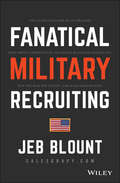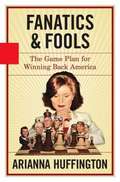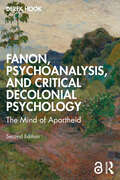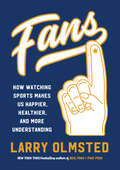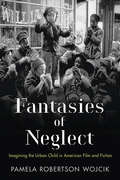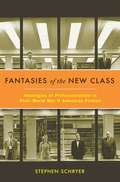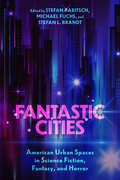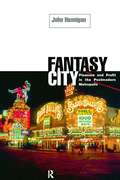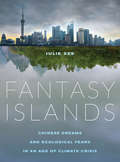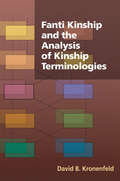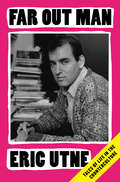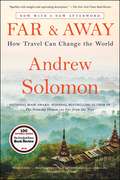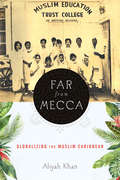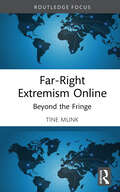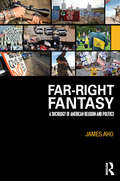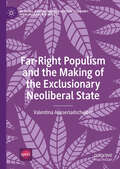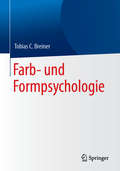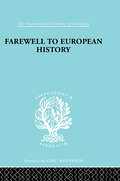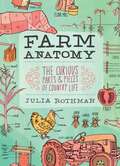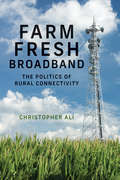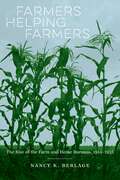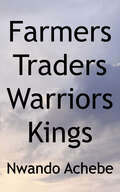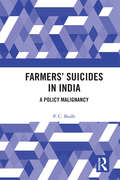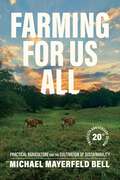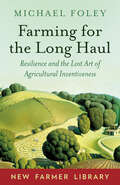- Table View
- List View
Fanatical Military Recruiting: The Ultimate Guide to Leveraging High-Impact Prospecting to Engage Qualified Applicants, Win the War for Talent, and Make Mission Fast
by Jeb BlountMilitary Recruiting is a war. It’s just a different kind of war than what you were prepared and trained to fight for. Recruiting is a war for talent. Smart, competent, and capable people are rare and in high demand. Every organization, from commercial enterprises, healthcare, non-profit, sports, and education, to the military is in an outright battle to recruit and retain these bright and talented people. Rather than bullets and bombs, the war for talent is won through high-impact prospecting activity, time discipline, intellectual agility, emotional intelligence, and human to human relationships. On this highly competitive, ever changing, asymmetrical battlefield, to win, you must operate at a level of excellence beyond anything asked of military recruiters before. Yet, in this new paradigm, many recruiters are struggling, and most recruiting units are staring down the barrel at 50 percent or more of their recruiters consistently missing Mission. It is imperative that we arm military recruiters with the skills they need to win in this challenging environment. The failure to make Mission is an existential threat to the strength and readiness of America’s fighting forces and our democracy. Fanatical Military Recruiting begins where the Recruiting and Retention colleges of the various branches of the military leave off. It is an advanced, master’s level training resource designed specifically for the unique demands of Military Recruiting. In FMR, you’ll learn: The Single Most Important Discipline in Military Recruiting How to Get Out of a Recruiting Slump The 30-Day Rule and Law of Replacement Powerful Time and Territory Management Strategies that Put You in Control of Your Day The 7 Step Telephone Prospecting Framework The 4 Step Email and Direct Messaging Framework The 5 C’s of Social Recruiting The 7 Step Text Message Prospecting Framework How to Leverage a Balanced Prospecting Methodology to Keep the Funnel Full of Qualified Applicants Powerful Human Influence Frameworks that Reduce Resistance and Objections The 3 Step Prospecting Objection Turn-Around Framework Mission Drive and the 5 Disciplines of Ultra-High Performing Military Recruiters In his signature right-to-the-point style that has made him the go-to trainer to a who’s who of the world’s most prestigious organizations, Jeb Blount pulls no punches. He slaps you in the face with the cold, hard truth about what’s really holding you back. Then, he pulls you in with stories, examples, and lessons that teach you exactly what you need to do right now to become an ultra-high performing recruiter. Fanatical Military Recruiting is filled with the high-powered strategies, techniques, and tools you need to keep your funnel packed with qualified applicants. As you dive into these powerful insights, and with each new chapter, you’ll gain greater and greater confidence. And, with this new-found confidence, your performance as a military recruiter will soar and you will Make Mission, Fast.
Fanatics and Fools: The Game Plan for Winning Back America
by Arianna HuffingtonAs America's leaders fight pre-emptive wars abroad and ordinary Americans fight to keep their heads above water here at home, Arianna Huffington offers a no-holds-barred account of where we stand and a clear and remarkable vision of where we should be headed.
Fanon, Psychoanalysis, and Critical Decolonial Psychology: The Mind of Apartheid
by Derek HookThis groundbreaking book examines the psychological dimension of decolonial thought in reference to foundational texts. Previously published as A Critical Psychology of the Postcolonial, this new edition foregrounds the central role of Fanon’s psychology.Highlighting the contributions of anti-colonial authors to the theorization of racism and oppression, the book demonstrates the pertinence of postcolonial and decolonial thought for critical social psychology and psychoanalysis via an investigation of a series of key topics. It explores the psychology of embodiment and racialization, resistance strategies to oppression, "extra-discursive" facets of racism, the phobogenic and sexual dimensions of anti-Blackness, and the roles of desire, fantasy, and unconscious in ideologies of racism. The book makes a distinctive contribution through discussing the work of authors drawn from anti-apartheid, psychoanalytic, and critical social theory traditions, including Steve Biko, J.M. Coetzee, Frantz Fanon, Julia Kristeva, Chabani Manganyi, and Slavoj Żiżek. This second edition continues to showcase a crucial set of critical resources for an anti-racist (decolonial) agenda, and is fully updated with new discussion, references, and images, with a new chapter on desire, fantasy, and apartheid ideology to strengthen the book’s engagement with apartheid racism.This is an invaluable text not only for students of critical social psychology, psychoanalysis, and sociology, but for students enrolled in courses on race, racism, or decolonial studies. It will also appeal to postgraduates, academics, and anyone interested in psychoanalysis in relation to societal and political issues.
Fans: How Watching Sports Makes Us Happier, Healthier, and More Understanding
by Larry Olmsted&“Olmsted opens a window into a psychologically compelling world of passion and purpose.&” —Harvey Araton, author of Our Last Season: A Writer, a Fan, a Friendship Larry Olmsted&’s writing and research have been called &“eye-opening&” (People), &“impressive&” (Publishers Weekly, starred review), and &“enlightening&” (Kirkus Reviews). Now, the New York Times and Washington Post bestselling author turns his expertise to a subject that has never been fully explored, delivering a highly entertaining game changer that uses brand-new research to show us why being a sports fan is good for us individually and is a force for positive change in society. Fans is a passionate reminder of how games, teams, and the communities dedicated to them are vital to our lives. Citing fascinating new studies on sports fandom, Larry Olmsted makes the case that the more you identify with a sports team, the better your social, psychological, and physical health is; the more meaningful your relationships are; and the more connected and happier you are. Fans maintain better cognitive processing as their gray matter ages; they have better language skills; and college students who follow sports have higher GPAs, better graduation rates, and higher incomes after graduating. And there&’s more: On a societal level, sports help us heal after tragedies, providing community and hope when we need it most. Fans is the perfect gift for anyone who loves sports or anyone who loves someone who loves sports.
Fantasies of Neglect: Imagining the Urban Child in American Film and Fiction
by Pamela Robertson WojcikIn our current era of helicopter parenting and stranger danger, an unaccompanied child wandering through the city might commonly be viewed as a victim of abuse and neglect. However, from the early twentieth century to the present day, countless books and films have portrayed the solitary exploration of urban spaces as a source of empowerment and delight for children. Fantasies of Neglect explains how this trope of the self-sufficient, mobile urban child originated and considers why it persists, even as it goes against the grain of social reality. Drawing from a wide range of films, children's books, adult novels, and sociological texts, Pamela Robertson Wojcik investigates how cities have simultaneously been demonized as dangerous spaces unfit for children and romanticized as wondrous playgrounds that foster a kid's independence and imagination. Charting the development of free-range urban child characters from Little Orphan Annie to Harriet the Spy to Hugo Cabret, and from Shirley Temple to the Dead End Kids, she considers the ongoing dialogue between these fictional representations and shifting discourses on the freedom and neglect of children. While tracking the general concerns Americans have expressed regarding the abstract figure of the child, the book also examines the varied attitudes toward specific types of urban children--girls and boys, blacks and whites, rich kids and poor ones, loners and neighborhood gangs. Through this diverse selection of sources, Fantasies of Neglect presents a nuanced chronicle of how notions of American urbanism and American childhood have grown up together.
Fantasies of the New Class: Ideologies of Professionalism in Post–World War II American Fiction
by Stephen SchryerAmerica's post–World War II prosperity created a boom in higher education, expanding the number of university-educated readers and making a new literary politics possible. Writers began to direct their work toward the growing professional class, and the American public in turn became more open to literary culture. This relationship imbued fiction with a new social and cultural import, allowing authors to envision themselves as unique cultural educators. It also changed the nature of literary representation: writers came to depict social reality as a tissue of ideas produced by knowledge elites.Linking literary and historical trends, Stephen Schryer underscores the exalted fantasies that arose from postwar American writers' new sense of their cultural mission. Hoping to transform capitalism from within, writers and critics tried to cultivate aesthetically attuned professionals who could disrupt the narrow materialism of the bourgeoisie. Reading Don DeLillo, Marge Piercy, Mary McCarthy, Saul Bellow, Ursula K. Le Guin, Ralph Ellison, and Lionel Trilling, among others, Schryer unravels the postwar idea of American literature as a vehicle for instruction, while highlighting both the promise and flaws inherent in this vision.
Fantastic Cities: American Urban Spaces in Science Fiction, Fantasy, and Horror
by Stefan Rabitsch, Michael Fuchs and Stefan L. BrandtContributions by Carl Abbott, Jacob Babb, Marleen S. Barr, Michael Fuchs, John Glover, Stephen Joyce, Sarah Lahm, James McAdams, Cynthia J. Miller, Fernando Gabriel Pagnoni Berns, Chris Pak, María Isabel Pérez Ramos, Stefan Rabitsch, J. Jesse Ramírez, A. Bowdoin Van Riper, Andrew Wasserman, Jeffrey Andrew Weinstock, and Robert Yeates Metropolis, Gotham City, Mega-City One, Panem’s Capitol, the Sprawl, Caprica City—American (and Americanized) urban environments have always been a part of the fantastic imagination. Fantastic Cities: American Urban Spaces in Science Fiction, Fantasy, and Horror focuses on the American city as a fantastic geography constrained neither by media nor rigid genre boundaries. Fantastic Cities builds on a mix of theoretical and methodological tools that are drawn from criticism of the fantastic, media studies, cultural studies, American studies, and urban studies. Contributors explore cultural media across many platforms such as Christopher Nolan’s Dark Knight Trilogy, the Arkham Asylum video games, the 1935 movie serial The Phantom Empire, Kim Stanley Robinson’s fiction, Colson Whitehead’s novel Zone One, the vampire films Only Lovers Left Alive and A Girl Walks Home Alone at Night, Paolo Bacigalupi’s novel The Water Knife, some of Kenny Scharf’s videos, and Samuel Delany’s classic Dhalgren. Together, the contributions in Fantastic Cities demonstrate that the fantastic is able to “real-ize” that which is normally confined to the abstract, metaphorical, and/or subjective. Consequently, both utopian aspirations for and dystopian anxieties about the American city become literalized in the fantastic city.
Fantasy City: Pleasure and Profit in the Postmodern Metropolis
by John HanniganFantasy City analyses the post-industrialist city as a site of entertainment. By discussing examples from a wide variety of venues, including casinos, malls, heritage developments and theme parks, Hannigan questions urban entertainments economic foundations and historical background. He asks whether such areas of fantasy destroy communities or instead create new groupings of shared identities and experiences. The book is written in a student friendly way with boxed case studies for class discussion.
Fantasy Islands
by Julie SzeThe rise of China and its status as a leading global factory--combined with an increasing desire worldwide for inexpensive toys, clothes, and food--are altering the way people live and consume. At the same time, the world appears wary of the real costs of this desire: toys drenched in lead paint, dangerous medicines, and tainted pet food. Examining sites in China, including the plan for a new eco-city called Dongtan on the island of Chongming, suburbanization projects, and the Shanghai World Expo, Julie Sze interrogates Chinese, European, and American eco-desire and the eco-technological fantasies that underlie contemporary development of global cities and mega-suburbs. Sze frames her analysis of these case studies in the context of the problems of global economic change and climate crisis, and she explores the flows, fears, and fantasies of Pacific Rim politics that shaped plans for Dongtan. She looks at the flow of pollution from Asia to the United States (ten billion pounds of airborne pollutants annually). Simultaneously, she considers the flow of financial and political capital for eco-city and ecological development between elite power structures in the UK and China, and charts how climate change discussions align with US fears of China's ascendancy and the related demise of the American Century. Fantasy Islands examines how fears and fantasies about China and about historical and political power change the American imagination.
Fanti Kinship and the Analysis of Kinship Terminologies
by David B. KronenfeldThis book examines Fanti kinship terminology from a variety of analytic and formal perspectives. Based on work with a broad number of informants, David B. Kronenfeld details and analyzes internal variation in usage within the Fanti community, shows the relationship between terminology and social groups and communicative usage, and relates these findings to major theoretical work on kinship and on the intersections of language, thought, and culture. The terminological analysis in this study employs a great variety of formal approaches, assesses the strengths and weaknesses of each approach, and covers a wide range of types of usage. This work also performs a systematic, formal analysis of behavior patterns among kin, joining this approach with the analysis of a kinship terminological system. Rather than treating kinship terminology as a special, isolated piece of culture, this study also ties its analysis to more general semantic and cultural theoretical issues. Including computational and comparative studies of kinship terminologies, this volume represents the fullest analysis of any kinship terminological system in the ethnographic record.
Far Out Man: Tales of Life in the Counterculture
by Eric UtneThe founder of Utne Reader chronicles his adventures on the frontlines of American culture—from the Vietnam era to the age of Trump—as a spiritual seeker, antiwar activist, and minor media celebrity. &“Fascinating . . . a remarkable piece of social history.&”—Bill McKibben, author of Falter: Has the Human Game Begun to Play Itself Out?Far Out Man is the story of a life-long seeker who was occasionally a finder as well. In 1984, Eric Utne founded Utne Reader, a digest of new ideas and fresh perspectives percolating in the arts, culture, politics, business, and spirituality. With the tag line &“The Best of the Alternative Press,&” the magazine was twice a finalist for a National Magazine Award and grew to more than 300,000 paid circulation. In the nineties, the magazine promoted the Neighborhood Salon Association to revive the endangered art of conversation and start a revolution in people&’s living rooms. More than 18,000 people joined, comprising nearly 500 salons across North America. Utne devoted the magazine to bringing people together to help make the world a &“little greener and a little kinder.&” Far Out Man serves as a chronicle of both an individual life and a generation, covering the conflicts of the Vietnam era, the hopes and excesses of the sexual revolution and the Me Decade, the idealism and depredations of the entrepreneurial eighties and nineties, and the promise and perils of the digital age. Ultimately, Far Out Man is the story of Eric Utne&’s lifelong search for hope, how he lost it, and what he found on the other side that sustains him in his darkest moments. It is a book dedicated to helping all seekers become finders.
Far and Away: Reporting from the Brink of Change
by Andrew SolomonFrom the winner of the National Book Award and the National Books Critics’ Circle Award—and one of the most original thinkers of our time—a riveting collection of essays about places in dramatic transition.<P><P> Far and Away collects Andrew Solomon’s writings about places undergoing seismic shifts—political, cultural, and spiritual. Chronicling his stint on the barricades in Moscow in 1991, when he joined artists in resisting the coup whose failure ended the Soviet Union, his 2002 account of the rebirth of culture in Afghanistan following the fall of the Taliban, his insightful appraisal of a Myanmar seeped in contradictions as it slowly, fitfully pushes toward freedom, and many other stories of profound upheaval, this book provides a unique window onto the very idea of social change. With his signature brilliance and compassion, Solomon demonstrates both how history is altered by individuals, and how personal identities are altered when governments alter.<P> A journalist and essayist of remarkable perception and prescience, Solomon captures the essence of these cultures. Ranging across seven continents and twenty-five years, Far and Away takes a magnificent journey into the heart of extraordinarily diverse experiences, yet Solomon finds a common humanity wherever he travels. Illuminating the development of his own genius, his stories are always intimate and often both funny and deeply moving.<P>
Far from Mecca: Globalizing the Muslim Caribbean (Critical Caribbean Studies)
by Aliyah KhanFar from Mecca: Globalizing the Muslim Caribbean is the first academic work on Muslims in the English-speaking Caribbean. Khan focuses on the fiction, poetry, and music of Islam in Guyana, Trinidad, and Jamaica. Combining archival research, ethnography, and literary analysis, Khan argues for a historical continuity of Afro- and Indo-Muslim presence and cultural production in the Caribbean. Case studies explored range from Arabic-language autobiographical and religious texts written by enslaved Sufi West Africans in nineteenth-century Jamaica, to early twentieth-century fictions of post-indenture South Asian Muslim indigeneity and El Dorado, to the attempted government coup in 1990 by the Jamaat al-Muslimeen in Trinidad, as well as the island’s calypso music, to contemporary judicial cases concerning Caribbean Muslims and global terrorism. Khan argues that the Caribbean Muslim subject, the “fullaman,” a performative identity that relies on gendering and racializing Islam, troubles discourses of creolization that are fundamental to postcolonial nationalisms in the Caribbean.
Far-Right Extremism Online: Beyond the Fringe (Routledge Studies in Digital Extremism)
by Tine MunkBy imparting crucial insights into the digital evolution of far-right extremism and its challenges, this book explores how far-right extremism has transformed, utilising digital spaces for communication and employing coded language to evade detection.Far-right extremism has spread extensively across online platforms. Flourishing within echo chambers, these groups propagate different types of online and offline actions and advance their hateful ideologies to a wide-ranging audience. This book highlights the issues surrounding far-right extremism, which distinguishing it from terrorism and examining its contemporary digital manifestations. Importantly, it sheds light on how far-right groups utilise online platforms for communication, radicalisation, and on-ground actions, relying on alternative truths, misinformation, conspiracy theories, fashion, and memes to connect with like-minded individuals. The book also addresses content moderation challenges and the impact of rising populism in today’s political climate, which fuels societal divisions and uncertainty.Far-Right Extremism Online is a valuable resource for academics, students, analysts, and professionals working in counter-extremism, cybersecurity, digital communication, and national security. It is also an indispensable guide for those concerned about far-right extremism in the digital age.
Far-Right Fantasy: A Sociology of American Religion and Politics
by James AhoFar-Right Fantasy is a straight-forward, jargon-free study of contemporary American right-wing extremism. Accessible to both professional and lay audiences, it allows activists to speak for themselves in their own words. It takes the self-announced religious motivations of extremists seriously, and illustrates this by citing numerous cases of radical politics. The book addresses the strengths and weaknesses of the standard psycho-social-cultural explanations of far-right activism. It shows how extremists are similar educationally and psychologically to their more conventional neighbors; that they get into the movement in the same way that others become peace activists or radical environmentalists, namely, through their ties with fellow workers and church-goers, family members, and classmates; and that their views are given a patina of certainty by being repeatedly corroborated within closed, non-contaminated communication systems. The book avoids being preachy or judgmental, but it does try to challenge readers morally by submitting far-right fantasy to a formal ideology critique. It does this by showing how the reforms it recommends – a marketplace free of regulation, draconian immigration restrictions; an end to the federal reserve bank and the income tax; a balanced budget amendment to the Constitution; anti-union "right to work" laws and a return to debt slavery; the privatization of schools, the post office, and the commons, and so on – contradict its ostensible goal, which is to protect and enhance middle class interests. Far-Right Fantasy is suitable for adoption as a supplemental text in political psychology and sociology, sociologies of religion and knowledge, collective behavior, and American political history.
Far-Right Populism and the Making of the Exclusionary Neoliberal State (Building a Sustainable Political Economy: SPERI Research & Policy)
by Valentina AusserladscheiderThis book examines the rise of exclusionary neoliberalism by assessing how far-right populist actors impact economic policy change. Drawing on the case of the Austrian Freedom Party, the book illustrates how neoliberalism emerged as a far-right political project in Austria. Tracing the Freedom Party´s ideational history, the book describes the making of the exclusionary neoliberal state through its establishment in the 1980s, its implementation in the early 2000s and how exclusionary neoliberalism was sustained after the Great Financial Crisis of 2008. The book thereby provides important insights on how domestic politics respond to challenges imposed by globalization and international market integration, and explains the less obvious ways in which exclusionary nationalist ideas can be deeply entangled with neoliberalism. The book will appeal to all those interested in far-right populism and its interrelation with political economy.
Farb- und Formpsychologie
by Tobias C. BreinerDieses Werk ist eine umfassende und praxisrelevante Darstellung zur Farb- und Formpsychologie. Mit einer klaren Sprache und über 100 farbigen Abbildungen wird Ihnen die komplexe Thematik auf eine wissenschaftliche und anregende Art veranschaulicht.Über eine allgemeine Einführung in die Grundlagen des visuellen Systems hinaus werden Sie ebenfalls spezielles Wissen zu Assoziationen, Wirkungen und Anwendungen bestimmter Farben und Formen erwerben. Speziellen Wert legt der Autor dabei auf deren Einsatz im Game Design. Es wird zudem erstmals eine neue Farbstudie präsentiert, die zeigt, dass die Assoziationen zu Farben sich in einem in sich logischen dreidimensionalen System anordnen lassen. Die daraus gezogenen überraschenden Erkenntnisse liefern mögliche Antworten auf fundamentale Fragen der Philosophie. Das Buch ist daher nicht nur ein Muss für Wahrnehmungspsychologen und Designer, sondern eine Bereicherung für alle an dieser Thematik Interessierten.
Farewell European Hist Ils 95 (International Library of Sociology)
by Alfred WeberFirst published in 1998. Routledge is an imprint of Taylor & Francis, an informa company.
Farm Anatomy: The Curious Parts And Pieces Of Country Life
by Julia Rothman<P>What's the difference between a weanling and a yearling, or a farrow and a barrow? Country and city mice alike will delight in Julia Rothman's charming illustrated guide to the curious parts and pieces of rural living. <P>Dissecting everything from tractors and pigs to fences, hay bales, crop rotation patterns, and farm tools, Rothman gives a richly entertaining tour of the quirky details of country life. <P>From the shapes of squash varieties to the parts of a goat; from how a barn is constructed to what makes up a beehive, every corner of the barnyard is uncovered and celebrated. <P>A perfect gift for gardeners, locavores, homesteaders, and country-living enthusiasts alike.
Farm Fresh Broadband: The Politics of Rural Connectivity (Information Policy)
by Christopher AliAn analysis of the failure of U.S. broadband policy to solve the rural–urban digital divide, with a proposal for a new national rural broadband plan.As much of daily life migrates online, broadband—high-speed internet connectivity—has become a necessity. The widespread lack of broadband in rural America has created a stark urban–rural digital divide. In Farm Fresh Broadband, Christopher Ali analyzes the promise and the failure of national rural broadband policy in the United States and proposes a new national broadband plan. He examines how broadband policies are enacted and implemented, explores business models for broadband providers, surveys the technologies of rural broadband, and offers case studies of broadband use in the rural Midwest. Ali argues that rural broadband policy is both broken and incomplete: broken because it lacks coordinated federal leadership and incomplete because it fails to recognize the important roles of communities, cooperatives, and local providers in broadband access. For example, existing policies favor large telecommunication companies, crowding out smaller, nimbler providers. Lack of competition drives prices up—rural broadband can cost 37 percent more than urban broadband. The federal government subsidizes rural broadband by approximately $6 billion. Where does the money go? Ali proposes democratizing policy architecture for rural broadband, modeling it after the wiring of rural America for electricity and telephony. Subsidies should be equalized, not just going to big companies. The result would be a multistakeholder system, guided by thoughtful public policy and funded by public and private support.
Farmers Helping Farmers: The Rise of the Farm and Home Bureaus, 1914-1935
by Nancy K. BerlageOne of the largest volunteer movements in the twentieth century, local farm and home bureau organizations have been woefully underrepresented in socio-political studies of the American Farm Bureau Federation. Nancy K. Berlage addresses this omission with an insightful look at how bureau members put university science to work in agricultural and rural life at the local level, even while industrialization, and urbanization profoundly shifted the landscape of labor in the U.S. In Farmers Helping Farmers, Berlage explores how bureaus served as the locus of science-based agriculture for rural communities. Drawing on community bonds and culturally powerful metaphors to overcome skepticism, bureaus played a critical role in circulating knowledge grounded in the new disciplines of agricultural economics, rural sociology, home economics, veterinary medicine, child science, and public health. Throughout the book, Berlage weaves a novel consideration of women's roles into the story of farm and home bureaus, noting that these organizations served as places where supporters could grapple with issues beyond farming practices such as child welfare, personal health, and gender ideals. They were also crucial in supporting the organization's underlying mission to strengthen community and family ties to the benefit of more efficient and productive farm. In addition to bureau documents, Berlage draws from cartoons, films, photographs, and personal correspondence, to add a human dimension this organizational history. The resultant analysis offers a fresh look at the local bureaus' social, economic, cultural, and political functions and book highlights the organizations' significant influence on American life in the early twentieth century.
Farmers, Traders, Warriors, and Kings: Female Power and Authority in Northern Igboland, 1900-1960 (Social History of Africa Series)
by Nwando AchebeThis is a brilliant and refreshing book, which gives ample and well-deserved voice to women...It is a book that will definitely be of interest to scholars and students in the fields of history, anthropology, political science, religion, and political economy. It is a must read for scholars and students in Women''s Studies Programs.
Farmers’ Suicides in India: A Policy Malignancy
by P. C. BodhThis book locates the malignant causes behind the factors leading to farmers’ suicides in India. It argues that not only a combination of innovative managerial and economic policies is required to make farming profitable, but also food production within the carrying capacity of soil, water, forests and economic and social resources must still be maintained. It brings together diverse themes, such as farming development and suicide statistics, as well as the developmental inertia evident in farmers’ welfare policy history. The book stresses the need to go beyond the narrow crop economics of minimum support price utility and towards recognizing the farm household economic nature of farming, reinventing the uniqueness of farmers as a productive class engaged in converting cosmic elements into food and adopting the budgetary support approach to bail out the farmers from the suicidal, debt-multiplying, production support approach. Lucid and topical, this book will be useful to scholars and researchers of political studies, political sociology, agricultural economics, political economy, public policy, sociology, agrarian and rural development studies, as also to policy analysts, governmental bodies and civil society activists.
Farming for Us All: Practical Agriculture and the Cultivation of Sustainability (Rural Studies)
by Michael Mayerfeld BellClimate change. Habitat loss. Soil erosion. Groundwater depletion. Toxins in our food. Inhumane treatment of farm animals. Increasing farm worker exploitation. Hunger and malnutrition in the midst of plenty. What will it take for farmers in the United States to embrace sustainable practices?Michael Mayerfeld Bell’s Farming for Us All first tackled this question twenty years ago, providing crucial insight into how the structure of US agriculture created this situation and exploring, by contrast, the practices of farmers who are working together to radically change how they think, learn, and grow. This updated edition of his now-classic work reflects on the lessons learned over the past two decades.Constrained by an oppressive nexus of markets, regulations, subsidies, and technology, farmers find themselves undermining their own economic and social security as well as the security of the land. Bell turns to Practical Farmers of Iowa (PFI), that state’s largest sustainable-agriculture group. He traces how PFI creates an agriculture that engages others—farmers, researchers, officials, and consumers—in a common conversation about what agriculture could look like. Through dialogue, PFI members crossbreed knowledge, discovering pragmatic solutions to help crops grow in ways that sustain families, communities, societies, economies, and environments.Farming for Us All makes the case that for sustainable farming to flourish, new social relations are as important to cultivate as new crops. This book is necessary—and hopeful—reading for anyone concerned about the present and future of food and farming.
Farming for the Long Haul: Resilience and the Lost Art of Agricultural Inventiveness
by Michael FoleyIt&’s all but certain that the next fifty years will bring enormous, not to say cataclysmic, disruptions to our present way of life. World oil reserves will be exhausted within that time frame, as will the lithium that powers today&’s most sophisticated batteries, suggesting that transportation is equally imperiled. And there&’s another, even more dire limitation that is looming: at current rates of erosion, the world&’s topsoil will be gone in sixty years. Fresh water sources are in jeopardy, too. In short, the large-scale agricultural and food delivery system as we know it has at most a few decades before it exhausts itself and the planet with it.Farming for the Long Haul is about building a viable small farm economy that can withstand the economic, political, and climatic shock waves that the twenty-first century portends. It draws on the innovative work of contemporary farmers, but more than that, it shares the experiences of farming societies around the world that have maintained resilient agricultural systems over centuries of often-turbulent change. Indigenous agriculturalists, peasants, and traditional farmers have all created broad strategies for survival through good times and bad, and many of them prospered. They also developed particular techniques for managing soil, water, and other resources sustainably. Some of these techniques have been taken up by organic agriculture and permaculture, but many more of them are virtually unknown, even among alternative farmers. This book lays out some of these strategies and presents techniques and tools that might prove most useful to farmers today and in the uncertain future.
